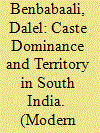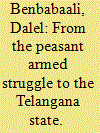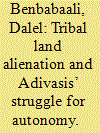| Srl | Item |
| 1 |
ID:
161708


|
|
|
|
|
| Summary/Abstract |
This article argues that taking territory into account is essential to understand the change in the scale and nature of caste dominance in contemporary India. The demonstration is based on an analysis of the socio-spatial trajectories of the Kammas—a dominant caste from Coastal Andhra, where they continue to own most of the land, even though they have migrated in large numbers towards the interior and southern regions of the Indian peninsula, both to newly irrigated areas and to the cities. The key positions they occupy in the politics and economy of Andhra Pradesh confer upon them a hegemonic character. However, this hegemony is threatened by the growing resistance of Dalits to caste and class oppression, while Kamma cultural domination, long contested in Telangana, is now challenged by the formation of the new state.
|
|
|
|
|
|
|
|
|
|
|
|
|
|
|
|
| 2 |
ID:
147385


|
|
|
|
|
| Summary/Abstract |
On 2 June 2014, Telangana was carved out of Andhra Pradesh and became the 29th State of the Indian Union after a longstanding campaign for autonomy. This redrawing of State boundaries, like the ones that preceded it in 2000 with the creation of Uttarakhand, Chhattisgarh and Jharkhand, was not merely about administrative reorganization in favour of smaller States and better governance, but a consequence of multiple factors involved in the construction of regional identities (Tillin 2013 Tillin, L. 2013. Remapping India. New States and Their Political Origins. Delhi: Oxford University Press.
[CrossRef]
).
|
|
|
|
|
|
|
|
|
|
|
|
|
|
|
|
| 3 |
ID:
187289


|
|
|
|
|
| Summary/Abstract |
Based on a case study of the Bhadrachalam Scheduled Area of Telangana, this article argues that the Adivasis of Central India seek autonomy as a response to their dispossession and to the accumulation of capital taking place in their resource-rich territories. The two main factors that have curtailed Adivasi autonomy through land alienation are analysed. The first is a process of agricultural colonization, wherein settlers belonging to agrarian dominant castes have moved into Adivasi territory and acquired tribal lands, thus dispossessing the original owners and reducing them to daily wage labourers. The second process is the industrialization of tribal areas where raw material is available and manpower is cheap, allowing for rapid accumulation through the exploitation of both nature and labour. Adivasis’ struggle for autonomy is therefore a way to reclaim control over their own resources and to preserve their distinct identity.
|
|
|
|
|
|
|
|
|
|
|
|
|
|
|
|